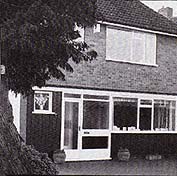The Early Years (6)
Written by Mark Hodkinson (OMUNIBUS PRESS)
*If you want to buy this book, go to Amazon.com!*

John's family home in Hidcote Road.
Chapter 1 : Clucksville (p.24--p.26)
For all the committed slog and sincere intent, four years after their début, The Opposition had not strayed more than a few miles from Leicester: they had no studio experience (though, just weeks after John left, they recorded an acetate of covers at Beck's studio in Wellingborough); no dealings with the music business aside from one or two local agents; and, perhaps most importantly, were not writing their own material. Their parochialism was epitomized by their decision, early in 1968, to buy a seven-year-old Morris van. A group with wider horizons would have used the money to fund a record pressing, or time in a studio, train fares to London to see potential managers, a poster campaign, or a complete re-location to the capital, but this wasn't The Opposition's style. "We wanted to be one of the best bands in Leicester, or around the locality," explains Richard. "I think I was under the misapprehension that the better you sounded and the more professional you got, you gradually went up the ladder, but it just doesn't work like that. It took me a long time to realise you could be a load of shit but if you got the right promotion you'd go far; that's what it is all about."
A new group came through in Leicester and The Opposition, especially Richard, were made decisively aware of the potency of promotion, style over content. In the space of just a few weeks a flash new group called Legay (named after the drummer's surname) were packing venues in the town; the same places at which The Opposition had appeared repeatedly, where they had diligently - but slowly - augmented their fan base. "Legay used to annoy Richard intensely," said Nigel Bullen. "They really had got the image. They were doing heavy rock versions of Tamla Motown and the places they played were packed with all the gorgeous women in Leicester. Musically they were very average." Unknown to the rest, John Deacon was already making salient mental notes. Legay, for their part, mutated into something far more routine; by 1970 they were Gypsy, stalwarts of the London pub circuit, eventually releasing two quietly received albums on United Artists.
Despite John's impending departure, Richard continued taking bookings for The Opposition. Some of these were out of town, in Southsea and Newcastle-upon-Tyne. A year after John's departure, however, Richard also left, to take up the position of pianist with Fearn's Brass Foundry. The soul covers band were appearing live five nights each week and had some of the finest musicians in Leicester; it was too much of a temptation to Richard who felt his own home-grown project had run its natural course. He drifted on to the cabaret circuit and stayed there for the next seventeen years. Music took him to many parts of the world when he became a performer on cruise ships, but he quit roaming in 1986 and set himself up in Leicester as a piano tuner and teacher.
The period during which John Deacon had been in The Opposition had seen profound changes in pop music. The Beatles and The Rolling Stones, to whom much of the decade's zeitgeist was subscribed, evolved from the radiant but callow pop of 'Help!' and 'Satisfaction' in the summer of 1965 to the ripened and urbane muse of 'Abbey Road' and 'Let It Bleed' just four summers later. Tommy Steele, Cliff Richard, Dusty Springfield et al invented the British teenager, but dressed it in similar clothes and the same benign attitude as its parents. By 1969 it had learned to be sullen, enigmatic, insolent, anything it wanted to be. The British brothers of the blues like Eric Clapton, Jimmy Page, Roger Daltrey, Ian Anderson, Keith Richards and Ray Davies had grown their hair, shredded the suits, and the din from the WEM speakers was no longer apologetic or restrained.
The Opposition had tried to assimilate this new energy - they used a fuzz box as early as October 1966, but they were decent lads from decent homes with 'A' Levels and college to work towards. John Deacon actually left Beauchamp with eight 'O' Levels and three 'A' Levels at grade A, a remarkable achievement considering his fairly heavy workload with the group. The Opposition had invigorated their set by judiciously adding covers by the likes of Jethro Tull and Deep Purple. In fact, Deep Purple were a seminal influence on John Deacon. On one of the last outings with his Leicester friends before he left for college, John, Richard and Nigel saw Deep Purple at the Royal Albert Hall. They were already enthused by Deep Purple's 'Book Of Taliesyn' album and the concert in London was with a full orchestral backing, to be released a year later as 'Concerto For Group And Orchestra'. "It was an amazing night, a big influence on all of us," said Richard. "We were mesmerised by it, the orchestra, the playing, we really thought it was something very special. We talked about it in the car all the way back to Leicester."
[Clucksville : The End]